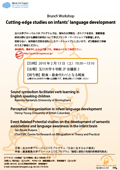2月13日(土)開催:
玉川大学グローバルCOEプログラム ブランチ・ワークショップ
Cutting-edge studies on infants' language development

*本イベントは無事終了いたしました。
多数のご参加ありがとうございました。
玉川大学グローバルCOEプログラムでは、下記の通りブランチ・ワークショップを開催します。気取らない、研究者間の交流を目的としたワークショップとしたいので、ぜひ朝食・昼食代わりとなる軽食をご持参のうえご参加ください。
海外の大学院生・ポスドクを招き、食事をとりながら彼らの最新の研究についてお伺いします。トークの後にはフリーディスカッションの時間を設けました。研究の内容に関する質疑のみならず、海外での研究活動などについても質問できる機会としたいと思います。
本ワークショップは若手研究者間の交流を主な目的としておりますので、分野の異なる方にもわかりやすくお話いただく予定です。分野にとらわれず、海外での研究活動・言語発達研究に興味のある大学院生・若手研究者の参加を歓迎します。
奮ってご参加ください。
玉川大学グローバルCOEプログラム「社会に生きる心の創成」
ブランチ・ワークショップ
「乳幼児における言語発達研究の最先端」
Cutting-edge studies on infants' language development
| 日時 | 2010年2月13日(土) 午前10時30分~午後1時10分 | ||||||||||||
|---|---|---|---|---|---|---|---|---|---|---|---|---|---|
| 会場 | 玉川大学 8号館2F 会議室2 小田急線「玉川学園前」駅より徒歩約10分  アクセスはこちらをご覧下さい(8号館は51番の建物です) アクセスはこちらをご覧下さい(8号館は51番の建物です) | ||||||||||||
| 持ち物 |
朝食・昼食代わりとなる軽食 (土曜日のため、大学内での購入は困難です。玉川学園前駅周辺にてご用意いただくことをお勧めします。) | ||||||||||||
| 講演 スケジュール |
| ||||||||||||
| 世話人 | 岡田 浩之(玉川大学) 今井 むつみ(慶應義塾大学) 宮崎 美智子(玉川大学) | ||||||||||||
| 主催 | 玉川大学グローバルCOEプログラム「社会に生きる心の創成」 | ||||||||||||
| 共催 | 慶應義塾大学グローバルCOEプログラム「論理と感性の先端的教育研究拠点」 |
講演内容
■Sound symbolism facilitates verb learning in English speaking children
Katerina Kantartzis (University of Birmingham)
Sound symbolism is the non-arbitrary link between the sound of a word and its meaning. Previous research suggests that children have difficulty when learning and generalizing novel verbs (Imai, Haryu & Okada, 2005; Maguire et al., 2002). However, Imai, Kita, Nagumo & Okada (2008) showed that Japanese speaking children benefited from the presence of sound symbolism when learning novel verbs. When taught a verb that sound symbolically matched the referent action Japanese children were able to learn and generalize the novel verb more successfully, than when the novel verb and action did not sound symbolically match. However, Japanese is a language rich in sound symbolic elements, English on the other hand is not. The present study investigated whether English-speaking three-year olds benefit from a cross-linguistically recognizable sound symbolic link between a novel word and its referent in word learning and generalisation. English speaking three-year olds were taught a novel verb and asked to generalize this to a new situation. Sound symbolism facilitated verb learning in English speaking children, as it had done with Japanese speaking children. This suggests that sound symbolism can facilitate word learning and generalisation regardless of the language children are learning.
■Perceptual reorganization in infant language development
Henny Yeung (University of British Columbia)
http://www.psych.ubc.ca/~hhyeung/
Perceptual reorganization describes "tuning" of infants' perceptual systems by information in the environment. This is a common process in many domains of infant behaviour (e.g., perceiving faces, speech, musical rhythms, etc.) This talk will discuss a detailed example of perceptual reorganization in speech: detection of phonetic infomration in foreign languages declines in the first-year of life as a function of exposure to the native language. The precise mechanisms underlying this reorganization will be reviewed, including a debate about whether reorganization is mediated by stochastic, bottom-up mechanisms versus top-down, socially mediated ones. A specific mechanism by which social interaction with infants may contribute to perceptual change in speech will be discussed.
■Event Related Potential studies on the development of semantic associations and language awareness in the infant brain
Jan-Rouke Kuipers(The ESRC Centre for Research on Bilingualism in Theory and Practice)
http://www.bilingualism.bangor.ac.uk/people/JRKuipers.php.en
In this talk I will present recent work on infant semantic processing and language awareness in mono- and bilinguals using Event Related Potentials (ERPs). From 13 months onwards, infants already show a N400 response to semantically incongruent picture-word pairs. Here I show that 16 month olds already show an adult-like graded N400 response for semantically related picture word pairs whereas 2 months earlier they do not. I also present data of a study into language change detection in monolingual and bilingual adults and toddlers. While the adult bilinguals show early detection and late stimulus re-evaluation mechanisms for a language change, bilingual toddlers do not distinguish between languages in their ERPs. These results seem to indicate that bilingual toddlers do not process words after a language switch differently, whereas bilingual adults dispose of detection on monitoring strategies to maintain the integrity of the incoming speech signal after the language spoken has changed.
お問い合わせ
玉川大学脳科学研究所 グローバルCOE研究員 宮崎美智子
Tel: 042-739-8326
eメール: myzk@lab.tamagawa.ac.jp
